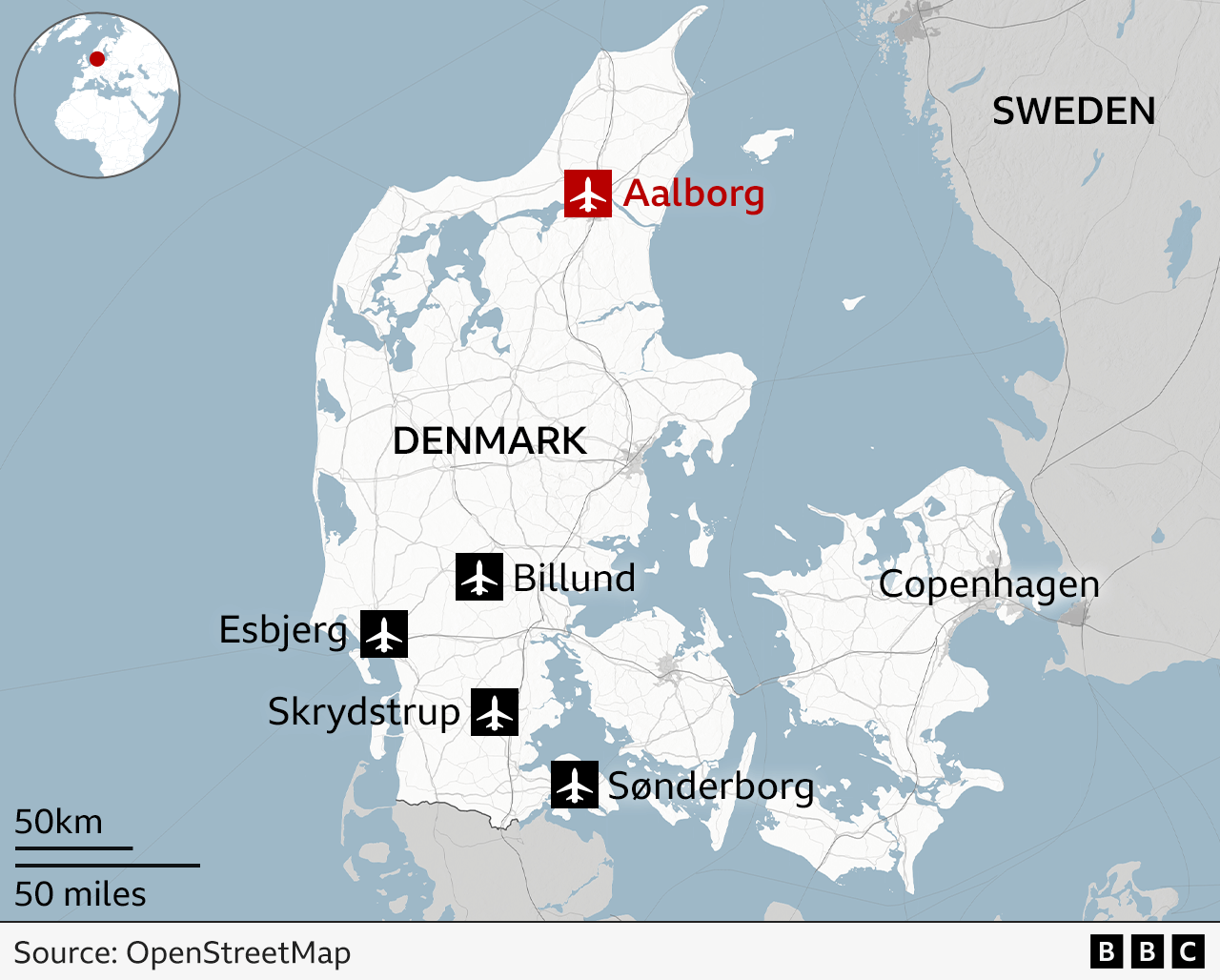Drone attacks leave Denmark exposed - and searching for response
Watch: Object seen flying away from Aalborg airport as drones disrupt flights
- Published
Drone incidents at airports and military bases all over Jutland, western Denmark, have not caused any harm or damage - and yet they have exposed the country's defences as vulnerable to attack.
In an era of hybrid warfare, there is a sense of embarrassment in Denmark - a founding member of the North Atlantic Treaty Organization (Nato) alliance - that its critical infrastructure has become so vulnerable.
Aalborg and Billund airports had to close on Wednesday night, while drones were spotted at Esbjerg, Sonderborg and Skrydstrup. Aalborg also serves as a military base and Skrydstrup is home to some of the air force's F-35 and F-16 war planes. Drones were also seen over the Jutland Dragoon regiment at Holstebro, external.
There have since been reports of police investigating drone activities around Denmark's oil and gas platforms in the North Sea, and near the central port of Korsor.
Aalborg airport briefly closed again on Thursday night following another suspected drone sighting, police and national media said on Friday.
The question now facing the country's military is how to respond.
Denmark says 'professional actor' behind drone incursions over its airports
- Published25 September
Russia's involvement in drone sightings cannot be ruled out, Danish PM says
- Published23 September
None of the drones have been shot down - defence chiefs decided it was safer not to, but that is not a long-term solution.
Denmark is, of course, not alone.
Norway, Estonia, Poland, Bulgaria and Romania have all been subjected to hybrid warfare in recent weeks. All are on Nato's eastern flank.
Estonia and Poland have both invoked Nato's Article 4 this month after Russian war planes entered Estonian air space for 12 minutes, and about 20 Russian drones violated Polish airspace and were shot down.
Denmark has said a "professional actor" was responsible for the drone attacks it saw, and left it at that.
Article 4 brings the defensive alliance together for consultation when a member's "territorial integrity, political independence or security… is threatened".
The Danish government is currently assessing whether to invoke it too.

This is a serious moment for Denmark, and its top brass - government, defence and police - quickly called a press conference where Defence Minister Troels Lund Poulsen said it looked "systematic", because of the number of locations targeted.
"This is what I would define as a hybrid attack," he said, without attributing blame as they have no concrete evidence.
Russia has not been ruled out - something Prime Minister Mette Frederiksen made clear after Monday night's drone disruption over Copenhagen.
Moscow "firmly rejects" any involvement and its embassy in Copenhagen has denounced the incidents as "staged provocation".
What is Nato and what do Article 4 and 5 cover?
- Published20 September
However, Frederiksen is in no doubt about the risk and said only last week that Russia "will be a threat to Europe and Denmark for years to come".
Nobody has yet come to any harm, primarily because the drones were left to fly their course.
Defence chief Michael Hyldgaard put it simply: "When you shoot something down in the air, something also comes down again."
An example of that was when the roof of a house was destroyed in Wyryki, eastern Poland, reportedly by a missile fired by a Nato jet.
Police in Jutland did say they would try to bring down the drones if it could be done safely, and the military has made clear it is prepared to do so over military installations, dependent on "the specific threat assessment and possible consequences of the takedown".
But it has not happened so far.

Aalborg airport was among those targeted by a wave of drones in Denmark
Kjeld Jensen, from the drone centre at the University of South Denmark, accepts it is embarrassing that Denmark's vulnerabilities have been laid bare - but he believes the police and military acted appropriately.
"I wouldn't shoot down the drones if they are over an urban area or an airport," he says, "as they have to come down, and there'd be other fuel or batteries creating a fire, which is also a risk you have to take into account."
"You need to decide whether it's more dangerous than letting it fly around," says Peter Viggo Jakobsen, of the Royal Danish Defence College. "But it's not a sustainable situation and we need to come up with ideas."
Denmark's cautious approach is markedly different from Poland's since Russia's drone incursions there on 10 September.
This week, Polish Foreign Minister Radek Sikorski warned Moscow at the UN: "If another missile or plane crosses our territory without permission, intentionally or by accident, and is shot down and its wreckage falls on Nato territory, do not come here to complain. You have been warned."
What Denmark and many of its neighbours lack is the kind of tools they need to bring down the drones.
The government recently announced plans for an "integrated layered air defence", along with investment in long-range precision weapons to hit enemy territory.
But that's of little use for Denmark's defences right now.
"From an engineering perspective it's so much easier to build a drone that can fly than to build something that can keep them from flying," Jensen, from the University of South Denmark, points out.
On Friday, Denmark will join several Nato allies and Ukraine to discuss the idea of erecting a "drone wall", proposed by European Commission President Ursula von der Leyen, to protect the EU's eastern borders.
The drones they will be discussing are more likely to focus on the kind of armed weapons that reached Polish airspace rather than the unarmed drones with bright lights seen over Denmark.
The aim is to create an early detection system, although again that may not have helped Denmark overnight if drones spotted over Jutland were launched locally.
If Russia was behind the latest drone disruption, despite its denials, then by the standards of hybrid warfare this operation appears to have been a success.
Airports were briefly closed, Denmark's military sites were made to look vulnerable, and senior ministers were forced to give a rushed press conference to allay public concerns.
But it has given Danes a new wake-up call. Police have raised their crisis level and the defence minister has spoken of the country facing a new reality.